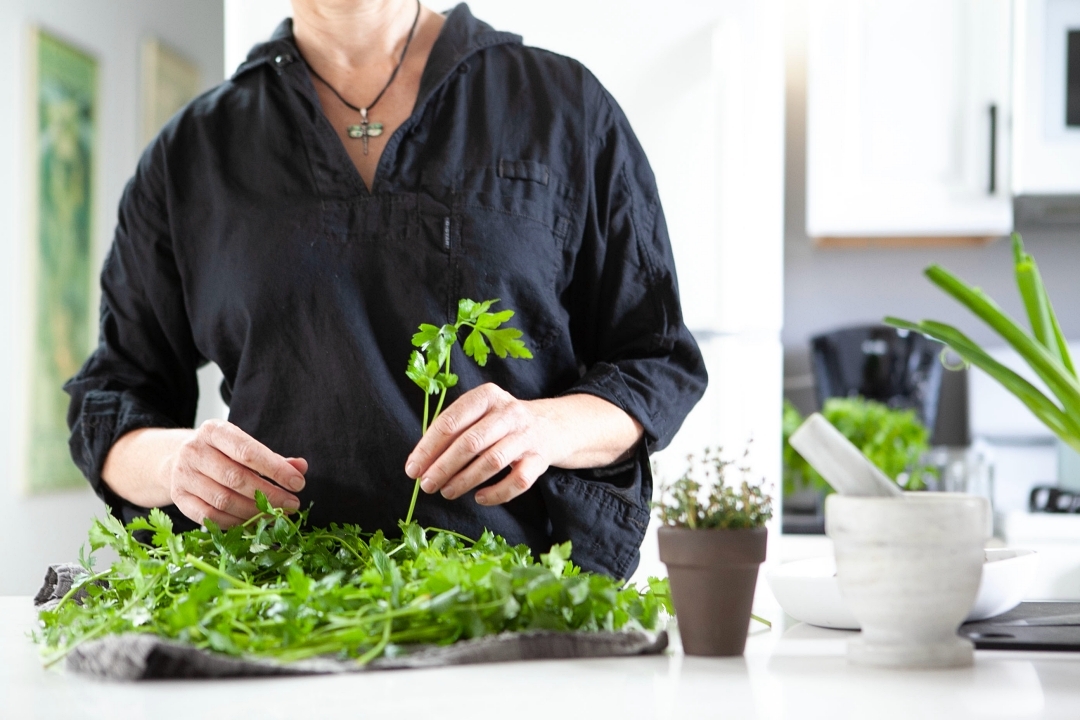Food as Medicine: Transform Your Everyday Meals
The kitchen holds more healing power than we often realise. Each ingredient we choose, every meal we prepare, becomes an opportunity to nourish ourselves at the deepest level. Food is not simply fuel—it carries the potential to support, restore, and strengthen our bodies in profound ways. This ancient wisdom reminds us that the most effective healthcare often begins with what we put on our plates. When we approach cooking as an act of care, we create meals that do more than satisfy hunger; we craft experiences that heal.
This isn't about perfection or strict rules. It's about making conscious choices that support your wellbeing, one meal at a time. Let's explore how you can weave the principles of food as medicine into your everyday cooking, creating meals that truly serve you.
What Is Food as Medicine?
Food as medicine is the practice of using whole, nutrient-dense ingredients to support the body's natural healing processes. It acknowledges that what we eat influences how we feel, how we heal, and ultimately, how we thrive. This approach draws on the understanding that every ingredient carries specific properties that can support or hinder our well-being.
Every food possesses an energetic quality. Cold water cools the body. Chilli warms it. Leafy greens can lighten and refresh, while cooked root vegetables and warming spices help us feel grounded. These aren't abstract ideas—they're observations that have guided traditional food practices for thousands of years.
Food as medicine also respects that we are all unique. What nourishes one person may not serve another in the same way. Your story, environment, and needs shape what balance looks like for you. There is no single diet that fits everyone, which is why this approach encourages you to listen to your body and learn what works best.
Why Food as Medicine Matters
The choices we make at each meal ripple through our entire system. Food is a powerful tool in healthcare, one that we have access to multiple times each day. When we choose ingredients that reduce inflammation, support digestion, and strengthen our body's natural defences, we create a foundation for lasting health.
Reduce Chronic Inflammation
Chronic inflammation sits at the root of many modern health challenges—from digestive discomfort and fatigue to joint pain. Reducing inflammation through an anti-inflammatory eating style allows the body space to heal, restore balance, and build resilience. This isn't about restriction; it's about abundance—filling your plate with foods that actively support your wellbeing.
Support Digestion & Detoxification
When your digestive system functions smoothly, your body can absorb nutrients effectively and eliminate what it no longer needs. This natural process of detoxification strengthens every system in your body, from your immune response to your energy levels. A healthy gut is the cornerstone of a healthy body.
Foster a Deeper Connection
Beyond physical health, food connects us to something larger. Preparing meals with intention creates moments of care and presence. Sharing them with others weaves connection and tradition into the fabric of our daily lives. These moments matter. They remind us that nourishment extends beyond nutrients—it encompasses community, culture, and the simple pleasure of a meal made with love.
Simple Ways to Cook with Healing Foods
Bringing food as medicine into your kitchen doesn't require complicated protocols or hard-to-find ingredients. It begins with simple shifts that honour whole foods, seasonal ingredients, and cooking methods that preserve nutrients while creating delicious meals.
Start with Whole, Unprocessed Ingredients
The foundation of anti-inflammatory cooking is to choose ingredients as close to their natural state as possible. Fresh vegetables, fruits, whole grains, legumes, nuts, seeds, herbs, and spices carry the nutrients and healing compounds your body recognises and knows how to use. When you shop at farmers markets or choose organic produce, you're investing in ingredients that are richer in nutrients and free from synthetic chemicals.
Embrace the Healing Power of Plants
Plants offer an extraordinary range of compounds that actively reduce inflammation.
- Leafy Greens: Kale, spinach, and silverbeet provide antioxidants and chlorophyll.
- Cruciferous Vegetables: Broccoli, cauliflower, and cabbage support detoxification pathways.
- Colourful Produce: Berries, capsicums, carrots, and beetroot deliver polyphenols that protect cells and calm inflammatory responses.
Herbs and spices deserve special attention. Turmeric contains curcumin, a powerful anti-inflammatory compound. Ginger soothes digestion. Garlic supports immune function. Cinnamon helps balance blood sugar. These aren't just flavour enhancers—they're concentrated sources of healing. Try adding a handful of fresh parsley or coriander to your meals each day for a simple boost.
Cook with Healthy Fats
Not all fats are created equal. Anti-inflammatory cooking prioritises fats that support cellular health. Extra virgin olive oil, avocado oil, and coconut oil provide stable fats for cooking. Omega-3-rich foods—walnuts, flaxseeds, chia seeds, and fatty fish—actively counter inflammation. A simple practice is to drizzle extra-virgin olive oil over roasted vegetables or cooked grains just before serving to preserve their beneficial compounds.
Choose Whole Grains and Legumes
Refined grains can spike blood sugar and promote inflammation. Whole grains like brown rice, quinoa, buckwheat, and oats provide fibre, B vitamins, and minerals that support steady energy and digestive health. Legumes—lentils, chickpeas, black beans—offer protein, fibre, and complex carbohydrates that keep you satisfied while supporting balanced blood sugar.
Practice Gentle Cooking Methods
How you cook matters as much as what you cook. High-heat methods like deep frying can create inflammatory compounds. Gentler techniques preserve nutrients and create more digestible meals.
- Steaming retains vitamins and minerals in vegetables.
- Slow cooking breaks down tough fibres, making them easier to digest.
- Roasting at moderate temperatures brings out natural sweetness.
- Simmering broths extracts minerals, creating deeply nourishing liquids.
Listen to Your Body and Honour the Seasons
Your needs will shift based on your health, the season, and your environment. In winter, your body may crave warming, grounding foods like root vegetables and hearty grains. In summer, lighter meals with fresh greens and cooling fruits may feel more aligned. Pay attention to how different foods make you feel. This awareness helps you refine your choices over time. Eating seasonally naturally aligns you with this rhythm, offering produce that is fresher and more nutrient-dense.
Moving Forward with Food as Medicine
Transforming your meals into medicine is a gentle, ongoing practice. It's about making choices that support your wellbeing, one meal at a time. You don't need to overhaul everything overnight. Small, consistent shifts create lasting change.
For further inspiration, you can explore resources like Botanical Kitchen, which offers practical guidance, company information, and a wide variety of recipes to help you incorporate whole, healing ingredients into your daily meals.
Start where you are. Choose one or two practices from this guide and weave them into your routine. Perhaps you'll add more herbs to your cooking, swap refined grains for whole ones, or simply spend a few extra moments preparing meals with intention.
Remember that cooking is one of the greatest acts of self-care. Each time you prepare food with awareness, you're doing something powerful for your health. You're reducing inflammation, supporting your body's natural resilience, and creating a foundation for lasting wellbeing. The food you choose influences how you feel, how you heal, and how you thrive.
FIND US ON SOCIAL: https://www.instagram.com/botanicalkitchen.eat/










 letter
letter